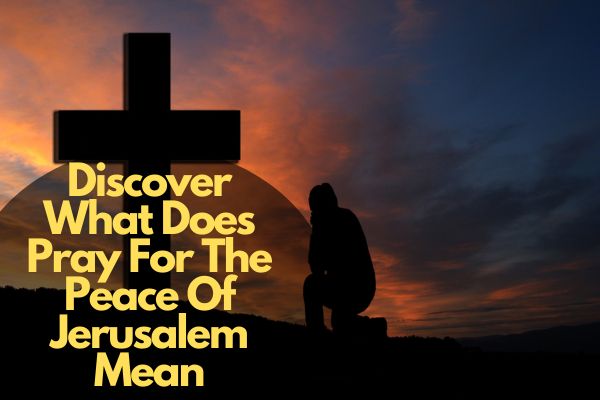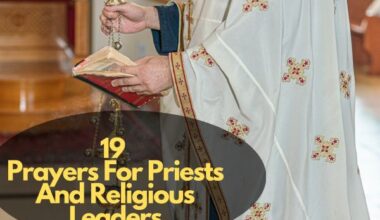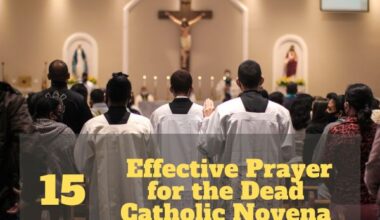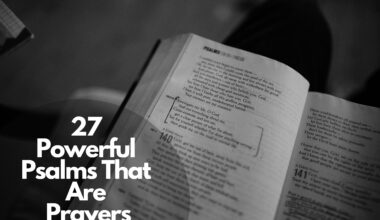Table of Contents Show
The phrase “Pray for the peace of Jerusalem” has deep historical and religious roots, resonating with believers from various faiths. In this article, we will explore the significance and interpretations of this phrase, its historical context, and its modern-day applications.
What Does Pray For The Peace Of Jerusalem Mean
The phrase “Pray for the peace of Jerusalem” has deep historical and religious roots, resonating with believers from various faiths. In this article, we will examine the significance and interpretations of this phrase, its historical context, and its modern-day applications.
The phrase “Pray for the peace of Jerusalem” is a call for blessings and tranquility in the city of Jerusalem. It is a request for divine intervention to ensure the well-being, harmony, and prosperity of this ancient city.
The Origin of the Phrase
The phrase can be traced back to the Bible, particularly in the Book of Psalms, where Psalm 122:6 states, “Pray for the peace of Jerusalem: May those who love you be secure.” This verse encourages believers to pray for Jerusalem’s peace and security.
Jerusalem’s Historical and Religious Significance
Jerusalem holds immense historical and religious importance. It is considered the holiest city in Judaism, a significant city in Christianity, and a place of great significance in Islam. The city’s rich history and religious ties make it a focal point for prayers and blessings.
Interpretations and Beliefs
1. Judaism: In Judaism, Jerusalem is revered as the site of the First and Second Temples. Praying for Jerusalem’s peace reflects the hope for the city’s well-being and the eventual rebuilding of the Third Temple.
2. Christianity: For Christians, Jerusalem is where many pivotal events in the life of Jesus took place. Praying for Jerusalem’s peace can be seen as a call for harmony and unity among Christians and as a reflection of Jesus’ teachings of peace and love.
3. Islam: In Islam, Jerusalem holds significance as the location of Al-Aqsa Mosque, one of the holiest sites. Prayers for the peace of Jerusalem are a way of invoking blessings upon this sacred place.
4. Other Religions and Perspectives: Beyond the Abrahamic faiths, Jerusalem’s significance extends to other religions and secular perspectives. The call to pray for Jerusalem’s peace transcends religious boundaries, promoting understanding and harmony.
Interfaith Connections
While originating from a biblical context, the notion of praying for the peace of Jerusalem transcends religious boundaries. People of various faiths, including Judaism, Christianity, and Islam, hold Jerusalem in high regard. This shared reverence for the city underscores the interfaith connections that prayer for Jerusalem promotes.
Practical Implications
1. Modern Applications of the Phrase: In the modern world, the phrase is often used to promote peace, unity, and stability, not only in Jerusalem but globally. It serves as a reminder of the importance of working towards peace and understanding.
2. Global Relevance: The call to pray for Jerusalem’s peace has a universal message, emphasizing the need for peaceful coexistence among nations and religions. It encourages people to think beyond their differences and seek common ground.
How to Pray for the Peace of Jerusalem
1. Personal and Collective Prayers: Individuals and communities can include prayers for Jerusalem’s peace in their spiritual practices. This can be done through structured prayers or heartfelt, personal supplications.
2. Actions Beyond Prayer: While prayer is essential, practical actions such as promoting dialogue, supporting peace initiatives, and advocating for justice in the region are equally crucial.
Challenges and Controversies
1. Political and Geopolitical Aspects: Jerusalem is a city with a complex political history, and the call to pray for its peace can sometimes be entangled in political debates and conflicts.
2. Interfaith Dialogue and Disputes: Interfaith dialogue surrounding Jerusalem can be a source of both understanding and contention. Differences in interpretations may lead to disagreements, but they can also be opportunities for greater understanding.
Common Misconceptions
Addressing common misconceptions about the phrase, such as assuming it is exclusive to a single religion or lacks contemporary relevance, is essential for a more accurate understanding. Here are some common misconceptions associated with this phrase:
1. Exclusivity to a Single Religion:
- Misconception: Some people mistakenly believe that this phrase is exclusive to a particular religion, typically Judaism or Christianity.
- Reality: “Pray for the Peace of Jerusalem” is a universal message that transcends religious boundaries. It is invoked by individuals from various faiths and is a call for interfaith harmony.
2. Irrelevance in Modern Times:
- Misconception: Some may think that the phrase is outdated and lacks contemporary relevance.
- Reality: The message remains relevant in the modern world, as it encourages peace, unity, and cooperation in a global context where conflicts persist.
3. Solely Religious Significance:
- Misconception: It is often misunderstood as a purely religious phrase with no secular or humanitarian implications.
- Reality: While rooted in religion, the phrase carries broader implications, inspiring humanitarian and peace-building efforts that transcend religious boundaries.
Historical Examples of Prayer for Jerusalem’s Peace
Throughout history, many leaders, religious figures, and peace advocates have invoked this phrase to seek blessings and peace for Jerusalem. Here are a few notable historical instances:
- King David (circa 1010-970 BC): In the Bible, King David, often associated with the Psalms, composed many verses that expressed his longing for the peace of Jerusalem. Psalm 122, in particular, contains the famous line, “Pray for the peace of Jerusalem.” David’s prayers were not only personal but also set a precedent for future generations.
- The Crusaders (11th-13th centuries): During the Middle Ages, Jerusalem was a focal point for Christian pilgrimages. The Crusaders, while embarking on their holy missions to the Holy Land, offered prayers for the peace and success of their endeavors in Jerusalem.
- Sultan Saladin (1137-1193): The Muslim military leader who famously recaptured Jerusalem during the Third Crusade expressed his desire for peace and coexistence in the city. Saladin’s actions and policies aimed at ensuring the safety and well-being of all residents, regardless of their faith.
- The Balfour Declaration (1917): The Balfour Declaration, issued by the British government during World War I, expressed support for the establishment of a “national home for the Jewish people” in Palestine. While this declaration had political implications, it was rooted in the idea of providing a peaceful homeland for Jewish people in the region.
Impact on Peace and Conflict Resolution
The act of praying for Jerusalem’s peace has, at times, played a role in diplomatic efforts and conflict resolution in the region.
1. Fostering Interfaith Dialogue and Understanding: One of the most significant impacts of the phrase is its ability to foster interfaith dialogue and understanding. It transcends religious boundaries, uniting believers from various faith traditions, including Judaism, Christianity, Islam, and more. By bringing people of different beliefs together in a common prayer for Jerusalem’s peace, it promotes dialogue, tolerance, and mutual respect. This interfaith harmony becomes a powerful tool in resolving conflicts and fostering peaceful coexistence.
2. Promoting Shared Values: “Pray for the Peace of Jerusalem” is a call to reflect on shared values that transcend religious and cultural differences. It underscores the universal human desire for peace, security, and prosperity. By emphasizing these shared values, the phrase reinforces the importance of cooperation and unity in addressing conflicts. It serves as a reminder that common ground exists even in the most diverse and contentious settings.
3. Historical Diplomatic Initiatives: Throughout history, this phrase has been invoked in diplomatic efforts. Leaders, both religious and political, have used it as a symbol of their commitment to peaceful conflict resolution. This has led to various diplomatic initiatives aimed at achieving peace in Jerusalem and the broader Middle East region. The phrase’s historical use in diplomacy highlights its role in promoting negotiations, ceasefires, and peace treaties.
4. Inspiring Peace Advocacy and Action: The call to pray for Jerusalem’s peace not only encourages prayer but also inspires action. Individuals, organizations, and peace activists take it as a call to work actively toward peace. It motivates humanitarian efforts, interfaith collaborations, and grassroots initiatives that address the root causes of conflict. This combination of prayer and action can lead to tangible change in conflict-prone areas.
Modern Significance
In today’s complex and interconnected world, the act of praying for the peace of Jerusalem remains relevant. It’s a symbol of hope and unity in the face of ongoing conflicts in the region. Individuals and organizations around the globe continue to utter this prayer as a reminder of the importance of peace.
Conclusion
“Pray for the Peace of Jerusalem” is a phrase that transcends religious boundaries, emphasizing the universal importance of peace and harmony. It holds deep historical and spiritual significance and carries a message that continues to inspire people worldwide to work towards a more peaceful and united world.
FAQs
1. Is the phrase “Pray for the Peace of Jerusalem” exclusive to a particular religion?
No, it is not exclusive to a single religion. It is used in various faith traditions and by individuals of different beliefs.
2. What practical actions can one take to support the peace of Jerusalem beyond prayer?
Supporting peace initiatives, engaging in interfaith dialogue, and advocating for justice and cooperation in the region are essential actions.
3. Is there any evidence that praying for Jerusalem’s peace has had a tangible impact on peace in the region? While it’s challenging to measure direct impact, the phrase has played a role in diplomatic efforts and peace advocacy.








